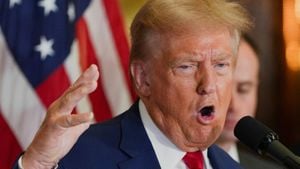Nigeria's drive to overhaul its energy sector is being hindered by significant economic challenges, where the rising costs associated with switching from petrol to compressed natural gas (CNG) have made many vehicle owners hesitant to make the transition. While President Bola Tinubu's administration positions CNG as a cleaner and cheaper alternative, the actual financial barriers are proving too steep for many.
The situation escalated after President Tinubu took office on May 29, 2023, and announced the removal of the fuel subsidy. This decision led to petrol prices skyrocketing—a staggering increase of approximately 488%, from N175 to N1,060 per litre from May to October 2024. Many Nigerians who rely heavily on petrol for transportation or electricity generation now find themselves paying significantly more at the pump.
Faced with these challenges, the government has turned its focus to promoting CNG as the fuel of choice for the future. The formation of the Presidential CNG Initiative aimed to encourage conversions from traditional fossil fuels to CNG, citing its benefits as being cheaper and environmentally friendly. Despite these efforts, the program appears to be facing obstacles, most prominently the soaring costs associated with converting vehicles to CNG, which has risen dramatically—from about N600,000 earlier this year to between N1.2 million and N1.6 million depending on vehicle type. Many vehicle owners are finding it hard to justify such expenses, especially when they deem the costs comparable to the worth of their own cars.
Tunde, who operates commercial transport along the Lagos-Ibadan Expressway, noted, "The cost of conversion is too much. The amount is even close to the cost of my car." This sentiment resonates widely among drivers who face the dual burden of high conversion costs and the inability to offer lower fares due to their own financial pressures. While some have converted their vehicles to CNG, they remain unable to reduce transport fares due to the costs involved, depriving them of the financial relief they sought.
Concerns about safety have also emerged, particularly following several incidents, including cylinder explosions, which have made many hesitant to embrace gas-powered vehicles. With only about 50 CNG refilling stations nationwide for over 200 million citizens, the infrastructure to support widespread adoption remains inadequate.
Adding to the woes, the instability of the Nigerian naira against the dollar has directly impacted the cost of conversion kits, which are imported. When the naira was floated two weeks after Tinubu's inauguration, it plummeted drastically—from around N400 to over N700 to the dollar, and today it trades at over N1,600, making imports even more expensive. Adewale Adedeji, Director of Business Development at Zeta Power Limited, pointed out how critically the exchange rate influences conversion costs, stating flatly, "The exchange rate is responsible for the rising cost of CNG conversion. Unless there is stability, costs will continue to rise."
Despite facing these barriers, the Nigerian government has announced several measures to stimulate interest and participation in the CNG market. Initiatives include partial subsidies for commercial vehicles, distribution of CNG vehicles to organizations, and extending conversion services without charge for certain groups, primarily commercial drivers. The government aims to convert one million vehicles to CNG by 2027, but experts express skepticism about whether this ambitious target is achievable, especially under current economic conditions.
Prominent energy expert, Professor Emeritus Wumi Iledare, weighed in on the situation. He acknowledged CNG's potential as part of Nigeria's energy mix but noted, "There is not enough infrastructure to give CNG the acceptance it deserves." Given the urgent need for comprehensive development of CNG fueling stations and conversion facilities, the government's progress remains slow.
On the investment side, Olu Verheijen, Special Adviser to President Tinubu on Energy, recently addressed the audience at the African Energy Week event. She emphasized the need for increased foreign investment, especially around oil and gas, where Nigeria has historically lagged behind other nations. She cited global investment patterns, lamenting, "Since 2016, Nigeria has managed to attract only four per cent of total investments in oil and gas, compared to less resourced countries enjoying larger shares." Verheijen pointed out the urgency for Nigeria to improve its appeal to investors by introducing new fiscal frameworks for deep-water and gas projects.
Efforts by the government intend to streamline approval processes and reduce project contracting timelines from as long as 38 months to about 135 days. These steps could lower operational costs, currently inflated by nearly 40%. Verheijen stated, "Our goal is to eliminate the 40 per cent cost premium and create an attractive environment for investment. We've already unlocked over $1 billion across the energy value chain, and we're working toward additional projects soon."
With more than 86 million Nigerians currently without stable power supply, promises are being made about significant increases to their electricity access. By 2027, the administration plans to guarantee 20 hours of electricity daily for urban consumers, reflecting the high hopes tied to the initiatives aimed at revamping the energy sector.
The collective intention to modernize Nigeria’s energy sector includes promoting CNG and other resources, but achieving broad public acceptance and participation hinges on the government addressing cost, infrastructure challenges, and investor confidence. Until these core issues are resolved, the prospect of transitioning away from petrol for many Nigerians remains grim.
Efforts continue as the government promotes the adoption of CNG as part of its long-term strategy for energy sustainability. Fueling greater reliance on alternative energy sources could also have broader economic repercussions, theoretically easing the national financial burden stemming from fuels imported at high costs.
Now, as Nigeria navigates these tumultuous economic shifts, it stands at the crossroads of opportunity and challenge. The strong push for CNG usage is more than just changing fuel types; it is intertwined with economic revival and the need to forge paths toward sustainable growth. The Tinubu administration's attempts to bring about these changes are indicative of broader aspirations to minimize the dependence on increasingly unaffordable traditional gasoline and diesel fuels, as communities are left to hope for structural solutions to empower their choices and livelihoods.



